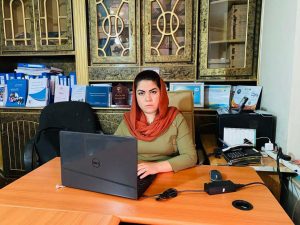Peace at every Cost is not Acceptable

Women’s rights activists are concerned about imposing restrictions on women by Taliban that might be supported by the government. They say that restrictions are not acceptable for them.
In an interview by CSHRN, Barakzai said that if the fundamental rights of the people are respected and men and women are treated equally before the law, the Taliban’s presence in the next government would not be so concerning. However, the absence of a guarantee for lasting peace is definitely concerning, and peace at every cost would not be acceptable.
CSHRN: Do women in the negotiating team have the capacity and ability to defend Afghan women citizen’s rights?
Barakzai: The peace talks are happening behind closed doors and the details are not shared with people. Therefore, we must wait until the outcome of the talks is announced to see that to what extent the government’s negotiating team has been able to defend the fundamental rights and freedoms of citizens.
She said that the people of Afghanistan, especially women, must be reassured that their fundamental rights are not being ignored and that women’s rights are the red line.
CSHRN: Network: What other issues should be the government’s red line?
Barakzai: All basic rights of citizens, including the right to education, the right to work, civil liberties, and the right to participate in associations, must be the red line of the government’s negotiating team. Afghan women are aware of their rights. They want to have the right to work after the peace agreement.
CSHRN: Given the Taliban’s view of women, do you think that they will respect women’s rights?
Barakzai: Unofficial reports indicate that Taliban are emphasizing gender segregation in schools, universities, and workplaces that are not possible by the current situation. Taliban’s non-abiding by their commitments on several occasions reveals the fact of their unchangeable view which is definitely concerning. However, it will not be a serious issue if their integration does not restructure the future government from the base.
CSHRN: Is the number of female members in the negotiating team acceptable for you?
Barakzai: It had been better if consultative meetings with civil society organizations, political parties, and women rights activists would have been held before finalizing the list of negotiating team members. The current composition is based on political considerations. For instance, the family members of political leaders are appointed in the negotiating team instead of those who are deserved for that position.
CSHRN: How optimistic are you about the outcome of these talks?
Barakzai: I hope that Afghan negotiating team members put sincere efforts to reach a favorable outcome. Regardless of their political affiliations, they must defend the fundamental rights of citizens so that the country does not relapse to the past.
She added that the peace talks are held behind closed doors and its details are not shared with free media. Furthermore, there is no guarantee of post-agreement peace.